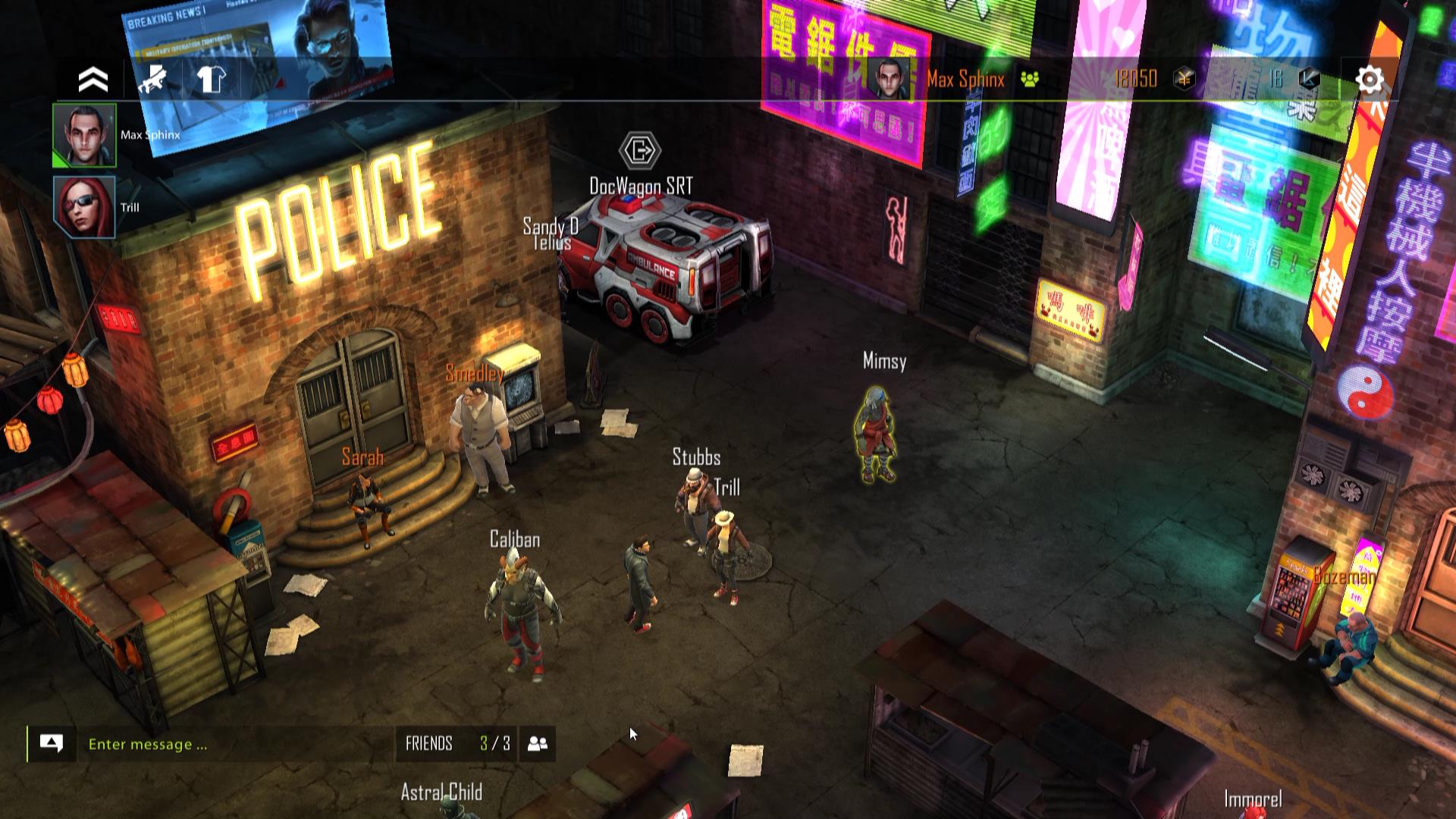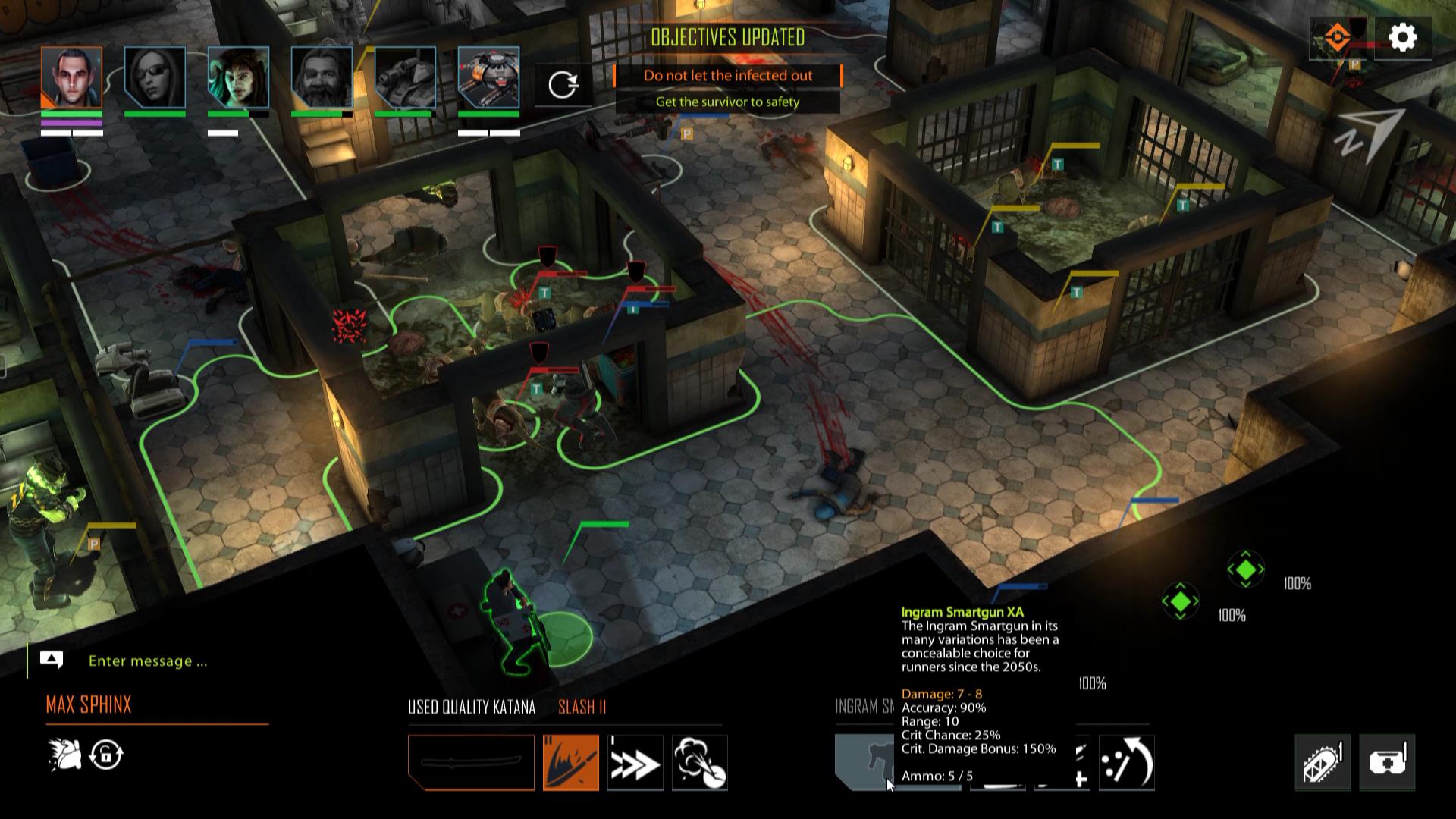

Shadowrun Chronicles: Boston Lockdown is part of a recent trend of needlessly subtitling games, a trend that includes The Witcher 3: The Wild Hunt, Ark: Survivor Evolved, and the ultimate subtitled game, Warhammer: The End Times -- Vermintide, in which even the subtitle is subtitled.
A subtitle suggests that the game's makers hope to launch a franchise, but the reality is that the franchise almost never happens. In the case of Shadowrun Chronicles: Boston Lockdown, I hope that's wrong, because more of this would be a good thing for co-op gamers.
So what is Shadowrun Chronicles: Boston Lockdown? If you've played games like X-Com or Jagged Alliance, this game is based a similar brand of turn-based tactical action. The Shadowrun universe is like a mash-up of Tolkien fantasy and cyberpunk, where dwarves and elves escape a dystopian future by jacking into The Matrix. The setting originated in a 1989 tabletop RPG and has been developed into a series of video games, starting with Shadowrun for the Super Nintendo back in 1993 and most recently with the PC/Mac/Linux title Shadowrun Returns in 2013. These previous Shadowrun games have been more traditional CRPG games for their respective eras, but Shadowrun Chronicles: Boston Lockdown just has light RPG elements. You've got an RPG's talent tree and gear progression, but basically you're just marching through a series of combat-heavy main missions and a few side missions. While there's a story tying it all together, there's no open world, or exploration, or dialogue trees, or anything else that you might expect in a full CRPG.

The first thing I judge any co-op game on is how easy it is to get me and my friends into the same game. SC: BL gets a middling grade on ease of co-op setup. In theory, all you have to do is bring up your list of friends and invite them to your party. The problem is that sometimes people don't show up as online even though they are (and Steam shows them as in-game). One workaround I discovered is to have the supposedly missing friend say something in the global chat, then you can right click the name in the chat window and invite from there. If that doesn't work, the supposedly missing person has to leave the game and come back until they show up for the party leader.

Right off the bat, the main gameplay itself is a lot of fun. If you've ever played something like X-Com and thought, "boy, I wish I could play this with friends as squadmates," you're likely to enjoy this. Each turn, you can execute one of two actions per character, but once you attack your turn is done regardless. All the good guys actions happen first, then the bad guys move, and so on, but there's no set ordering of actions among you and your team. Anyone with an action left can act at any time, which creates some good possibilities for strategic teamwork. Maybe you need one player to use a stun grenade to keep a couple of bad guys on ice for one turn while everyone else beats on a boss, for example. Or, some attacks will leave an enemy marked, and those marks can be exploited by other player's abilities.
This is where having a voice communication with your friends like Mumble or Teamspeak really comes in handy. While you could use the game's text chat to coordinate actions, in my experience, it makes the game too slow and players will make their moves when they feel like it rather than negotiate through the chat window.
Player synergy extends to character advancement and customization, which occurs in-between missions in a colorful back alley which also functions as the lobby for pick-up team building. Successful missions award karma points that are spent on abilities in various talent trees. The first two trees, labeled Mind and Body, are sort of generic, aiding damage and survivability and providing additional ways to loot during missions. (My favorite loot ability is organ harvesting. Don't ask me why people in the dystopian mutant future have money hidden in their kidneys, but they do.)
All the other trees are based upon certain gear. So pistol skills are only useful when you are carrying a pistol, and rigging allows you summon drones to fight with your team, but only if you are carrying a remote control. You can only carry two pieces of offensive gear into each mission, and they can't be changed during a mission, so if you are regularly playing with the same group of friends, it makes sense to specialize in different trees to cover the most bases.
If a player is downed during a mission, it starts a timer, and you have just five turns to finish the mission or you lose. In some missions you'll be escorting the usual dead-weight NPCs, and if one those goes down the mission is immediately lost. But if you lose a mission you just go back to the hub and you can try again.
The game length is solid, with 32 main missions and about half as many optional side missions. For whatever reason, the first few missions, though, are only two-player co-op, and then starting around the sixth mission you can play four-player co-op. If you don't have enough live people to make up a party you can recruit from a pool of NPCs; the NPCs appear to automatically be level-balanced with the party, which is nice. When you are all done with the main missions, there's an endgame with repeatable missions.
The main missions show good variety, with some missions offering multiple paths to the end, or optional ways to bypass certain enemies if you keep your eyes open. And while most missions have you marching from a starting point to a goal, others require you to defined a location. In other cases, the mission must be completed in a limited number of turns. Even with this variety, though, the action can get a little stale after a while. In the end, it's all combat, and the combat tends to play out similarly in missions with the same types of enemies. That said, there's a decent variety in enemies, too.
Probably my biggest gripes about this game are quirks with the interface. For example, suppose I go to the gun merchant to buy a new gun. As I click on different guns in the shop, the stats for each gun are shown in relation to the weapon I currently have equipped as my primary weapon. But since I can carry two weapons, my gun might be my secondary weapon, and there's no easy way to switch the primary and secondary slots. To get any use out of the stat comparison display, I have to manually equip something else in the secondary slot to get the gun in my inventory and then swap it for the primary weapon, then go back into the shop.
And when you are in a mission, it's easy to forget which weapon you used last and wind up shooting a guy that you just ran up to so you could cut him down with your sword. Which, in turn, puts you in the habit of clicking on the weapon you intend to use before you use it--but, if you have a gun active and you click on it, you'll reload the weapon and waste your turn.
So the interface can be a pain. And some people complain about the voice acting in this game. As the subtitle suggests, the game is set in a (locked-down!) Boston, and the voice cast was apparently instructed to make this clear by having everyone do their worst impersonation of Mayor Quimby from The Simpsons. But hey, I played the first Resident Evil, and compared to that, this game is a Broadway production.
So what's the bottom line on Shacron: Bostlock? My gaming group wanted a co-op experience that would give us a break from frenetic action games that tax our limited set of skillz (e.g., Rocket League). And that's what this game does. It's fun in the way tabaletop gaming is fun, where there's pressure to get things right but you can still relax, and the missions are short enough that when you screw up you haven't wasted half an evening for nothing.
On that basis, Sc:bl is recommended for fans of turn-based combat who want some co-op fun, as long as you understand that it's all about the missions, and you're not getting a co-op MMORPG. I haven't played any pick-up games with a host of Rando Calrissians, so I don't know how that would go, but I worry that without clear teamwork the game might be frustrating. I also don't know that is has much appeal to me as a single player game, so if you are intending to fly solo, you might check out the other games in the Shadowrun universe first.